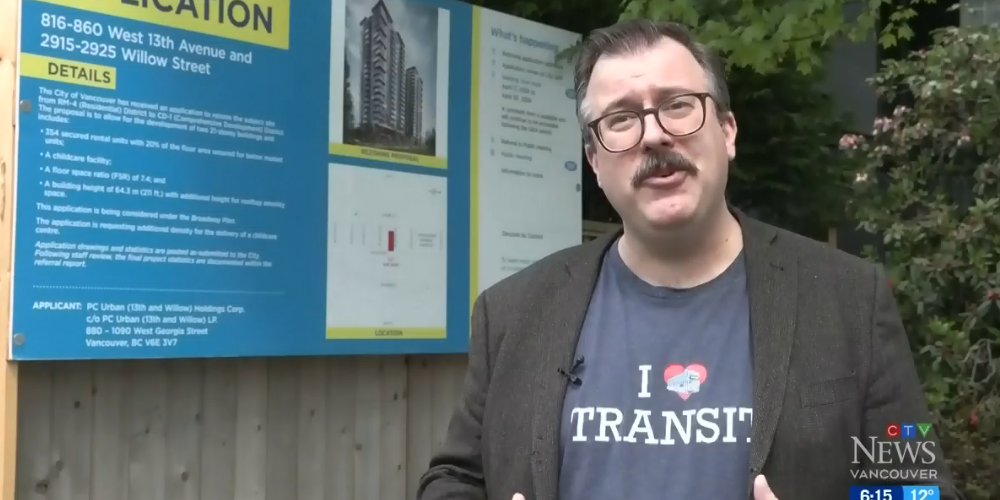Writing & Op-eds – A collection of housing op-eds and some other writings.
Interviews & News – Interviews with me and news articles quoting or mentioning me.
Video – Other videos featuring me (mainly Megatower Polka related!)
If you’re looking for a place to start, Stephen’s Quinn interview of me on The Early Edition (December 12, 2024) is one of my favourite things I’ve done. Stephen Quinn is a fantastic interviewer–his questions were challenging, but gave me great opportunities to articulate some of my views.
He started by asking why me and Abundant Housing Vancouver advocate for more “density”, which allowed me to correct a common misapprehension:
“We’re not really pro-density…we’re pro-housing. … Density isn’t something we advocate for for the sake of density, it’s not some sort of aesthetic goal. Rather, we believe in a very simple thing: housing is good.”
If you want a deeper dive into my thinking on housing, in spring 2025 I completed a Master of Laws (LL.M) degree from UBC, and you can read my thesis here. It’s about the wave of legislative reform we’re seeing where senior levels of government are getting more active in land use regulation, in particular in order to critique BC’s recent housing reforms, but along the way I needed to do some thinking about developing a theoretical way of thinking about values, property, and zoning. It’s called “Values and Propriety in Zoning: Contextualizing British Columbia’s Housing Reforms”.
I tried to summarize my views as concisely as possible in what I called the principle of abundant housing:
The legal system should, in a given area, support housing in sufficient quantity to meet demand in that area.
In other words, there should be enough housing for everyone who needs housing, in the areas people choose for themselves. This might seem obvious, but it’s actually a fundamental departure from our current planning and land use regime, which places the status quo and antiquated ideas of “fit” (built on classist and racist objectives of enforcing social hierarchies) as the top priorities.
The title of my thesis also highlights another big part of my thinking about housing: yes, it can get wonky, but fundamentally it’s about values. So I particularly enjoy it when that comes through in an interview or article I’m in, like this one:
“Putting a 20-storey apartment building on a block which has single family housing or low rise housing really changes the whole look and feel of it,” said Tielemen.
Bill Tielemen, a long-time opponent to the plan, said he doesn’t think high-rises belong on certain residential streets.
That’s the point, according to Peter Waldkirch, the director of advocacy group Abundant Housing, who said the development on West 11th is an ideal location to build because it’s in a low density area near transit.
“We need to legalize more housing exactly on places like this on the side streets of the city, so renters can also enjoy our quiet neighbourhoods without having to live on these busy, polluted, arterial roads,” he said.
Waldkirch said while he empathizes with those who are hesitant to the proposed projects, he adds the status-quo isn’t working.
“It’s time that some change be welcomed in and while that can be scary for people, it’s how we’re going to build a better city,” he said.
Like I said: housing is good!
